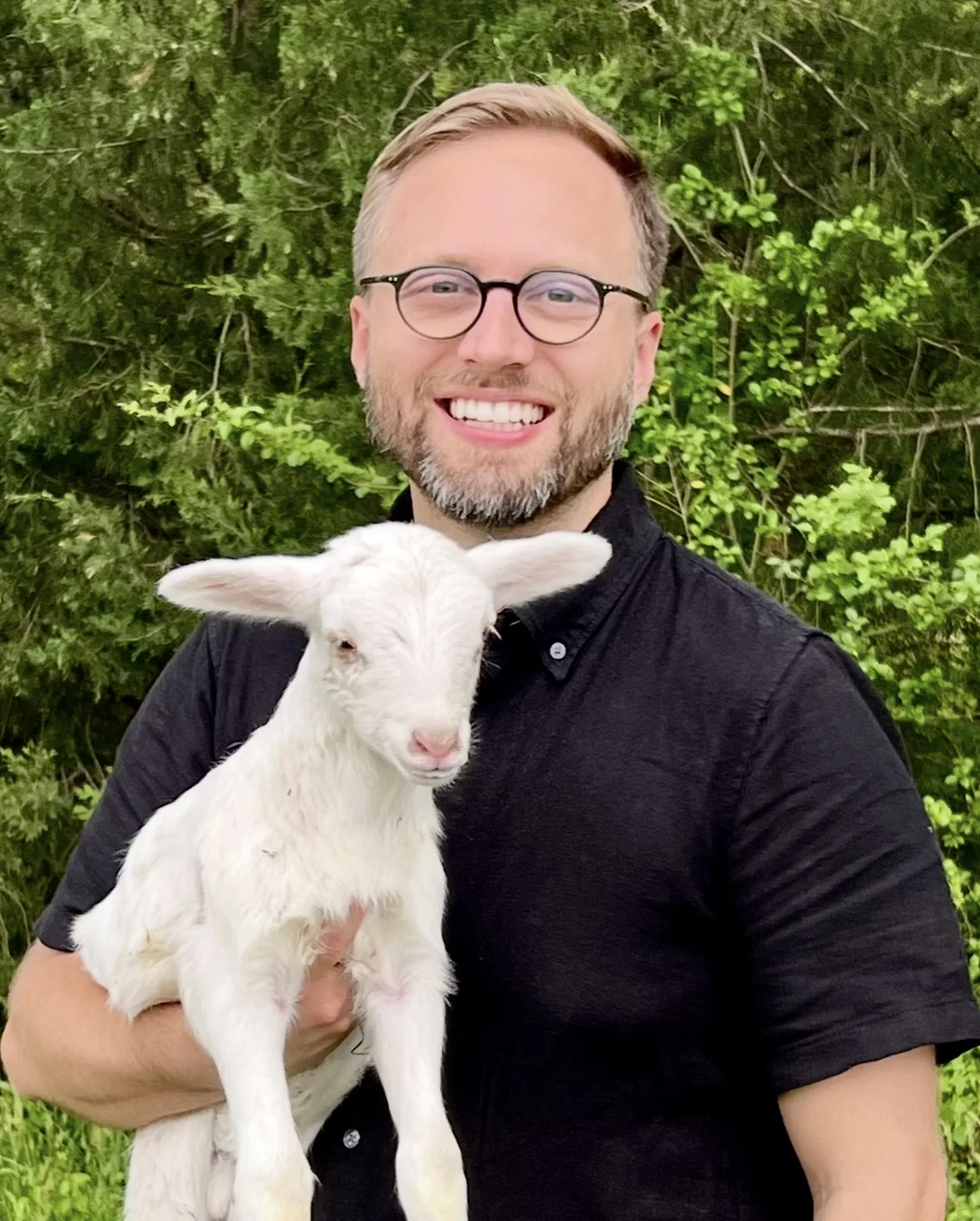What if we stopped trying to control nature and started working alongside it?
At our final Juneberry Jams fireside chat, Daniel shares how reconnecting with nature’s rhythms isn’t just about restoring land—it’s about restoring ourselves. Watch the full fireside chat below.
A path to restoring the land and ourselves
On June 22nd, 2024 at 5:15 PM, Ashton, our Chief Operating Officer, introduced Daniel Firth Griffith, a hunter-husbandman, storyteller, and award-winning indie author, as our third and final fireside chat guest speaker of our three-weekend long Juneberry Jams festival. As the evening unfolded, Daniel challenged us to rethink our relationship with nature. Through his unique philosophy of “kincentric” rewilding, he reminded us that working with nature instead of against it transforms not just landscapes but ourselves, too.
Daniel began by discussing rewilding, a movement to restore land to its natural state by encouraging native plants, animals, and ecological processes to thrive. His experience restoring the land over the past decade at Timshel Wildland, a kincentric rewilding project he co-founded in central Virginia, served as inspiration for his latest book, Stagtine. He shared it’s not as simple as letting nature take over. Even in rewilding, there’s an element of human control, he explained. However, Daniel believes in working with what we’ve been gifted—honoring and enhancing the land within its existing parameters.
This perspective inspired what he calls kincentric rewilding, a term that his book uses to define the relationship that all of life has with one another. Daniel explained that “kincentric” combines kin (kinship) and centric (concentric). The kinship side reflects the idea of a single living system—this sense of oneness where we all work together. But there’s also the concentric side, which reminds us of the cycles of death, rebirth, and many other interconnected rhythms of life.
Daniel challenged us to reflect on our place within these cycles: What is our role in these natural systems? Kincentric rewilding he explained isn’t just about restoring the land—it’s about restoring ourselves. It’s about finding balance, working with nature instead of trying to control it, and reawakening our connection to the earth in the process.
The importance of happy cows
Ashton shared an idea that resonated deeply, food isn’t just something we eat—it’s what connects us. “Not only does food bring us together,” Ashton said, “but for a lot of people, it’s the only connection they have to the natural world on a daily basis.” Think about it—the vegetables on our plates, the bread we slice, even the coffee in our cups—they’re all little reminders of how tied we are to the earth, whether we realize it or not.
This connection becomes even clearer when we look at the animals that feed us, particularly cows. Dan Kittredge, founder of the Bionutrient Food Association, is researching nutrient-dense beef, exploring what it means for beef to deliver health benefits. But what’s more important for our well-being—nutrient-rich soil that produces nutrient-packed beef, or happy soil that nurtures happy cows?
What a cow eats and how it lives doesn’t just affect its own well-being—it affects us, too. If a cow eats feed sprayed with glyphosate, a chemical herbicide that’s known to wreck the gut microbiome, we’re essentially inheriting that glyphosate when we consume its meat or milk. Beyond physical health, Daniel posed a fascinating question. If happiness is biochemically driven, could eating meat from stressed or unhappy cows transfer those stress-related chemicals to us?
This idea challenges us to see food as more than just fuel. It’s a transfer of energy, life, and maybe even emotion. What we eat connects us—not just to nature, but to the lives that sustain us.
How plants “communicate” with us
It’s not just animals—plants have a story to tell, too. The Xenohormesis Hypothesis dives into this idea, showing us how plants adapt to stress and pass those adaptations on to us. For example, resveratrol—a compound in red wine—helps stressed plants survive harsh conditions while influencing the biology of the humans who consume it.
Daniel shared a compelling study about asparagus that reframed how we view food as communication. In this study, asparagus—a spring crop—was grown in a hoop house during winter. The plant anticipated warm weather, but when it didn’t arrive, the asparagus chemically adapted to the colder conditions.
Here’s the fascinating part: when people ate this asparagus, their bodies adjusted to the plant’s “message.” The usual transition from spring to summer didn’t occur. It’s as if the asparagus was saying, “Wait—summer isn’t here yet,” and their bodies listened.
Our food isn’t just nourishment; it’s a conversation. Each bite carries signals from the environment where it grew, speaking directly to our bodies. This reminds us that what we eat is far more than calories—it’s a conversation with the world around us.
How food deepens our connection to nature
Food speaks most clearly when we eat seasonally and locally. Local, seasonal eating isn’t just trendy or fresh—it’s about syncing with nature’s rhythms. It’s about choosing foods that align with the cycles of the earth.
Daniel put it beautifully: “When we start to turn locally, we start to understand that local food matters. And once we understand this, we begin to see that the people preparing that local food on local landscapes matter. Suddenly, community erupts.”
That’s where the magic happens. Eating local isn’t just about feeding ourselves—it’s about investing in something bigger. It’s about farmers, land, and communities working together in harmony. When these pieces fit, food becomes more than sustenance—it becomes the glue that binds us to one another and the earth.
In summary, Daniel Griffith reminded us that working with nature isn’t about letting go or taking over—it’s about finding that sweet spot of partnership. When we embrace the natural rhythms around us, we discover how interconnected everything truly is.
We’re all part of the same system. Kincentric rewilding shows us that life is a beautiful cycle—growth, death, and rebirth all working together. When we lean into these rhythms, we don’t just heal the land—we heal ourselves, too.
Healthy land, healthy lives. Whether it’s plants or animals, their health directly affects ours. If we care for them—through ethical, thoughtful practices—they give that care right back to us. It’s a win-win for everyone involved.
Food is our lifeline to nature. Every meal carries the stories of where it came from, whether it’s the soil that grew it or the hands that harvested it. By eating local, seasonal food, we strengthen our bond with the earth and the people around us.
In the end, it’s simple: we’re not separate from nature—we are nature. And when we work with it instead of trying to control it, we create a world where everything—land, animals, plants, and people—can thrive together. It’s a journey worth taking, one meal, one moment, one connection at a time.
About Juneberry Jams
Juneberry Jams is an annual summer festival celebrating regenerative agriculture, great music, and farm-fresh food in Stanly County, North Carolina. The festival is hosted by Juneberry Ridge, a 750 acre farm, education center and events destination in Norwood NC. There’s no better place to build community and learn about soil health, local food, and holistic farm management than the local farms forging the path for healthier agriculture.
Juneberry Jams was made possible by title sponsor and community partner, Uwharrie Bank as well as Kinetic by Windstream, and Visit Stanly. Community sponsors also included local business leaders, Stokes Construction, Precision Mechanical, and Uwharrie Technology. Music programming was produced in partnership with Charlotte-based non-profit, Tosco Music.
About Daniel Firth Griffith
Firth Griffith is a hunter-husbandman, storyteller, and award-winning indie author of four books. His latest book, Dark Cloud Country, came out in 2023 and won two INDIE Awards in Nature and Environment. Described as the poet laureate of the climate crisis by Allan Savory—the Zimbabwe-based originator of Regenerative Agriculture—he is the founder of Timshel Wildland, the largest rewilding and relational conservation project in the Eastern United States. Timshel’s work was most recently featured in India’s largest progressive media organization, The Wire.
Daniel is also the co-founder and President of the Robinia Institute, a center for rewilding’s social emergence and the Mid-Atlantic’s Educational Hub of the Savory Institute.
Daniel is the host of Denusion and writes regularly on Substack under Denuding the Illusion. He writes for Resilience.org, Permaculture Research Institute, Front Porch Republic, and the Stockman Grass Farmer, among others.
Daniel lives in Virginia with his wife and three children.



